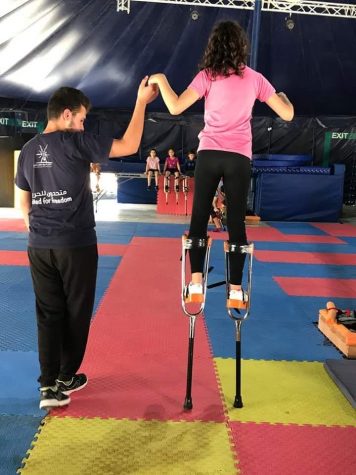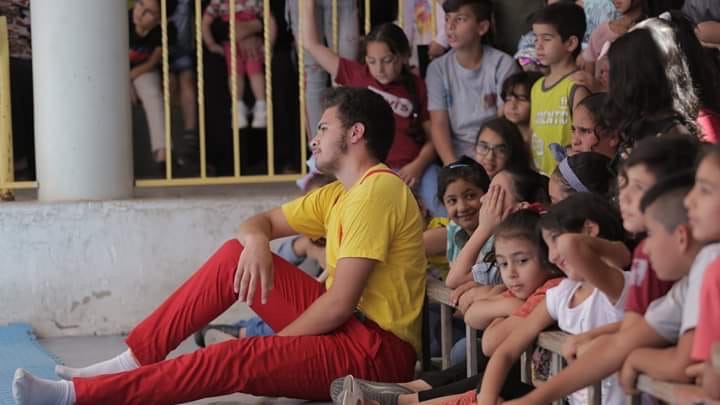Culture Shock
The Live Wire dives into the culture of Palestine and the life of exchange student Mohammad Awwad.
February 13, 2020
Mohammad Awwad, senior, is an exchange student from Palestine. When he came to America, he was honestly disappointed that he ended up in Iowa. But Awwad certainly has had an interesting life and an interesting experience in Palestine and in America so far. One thing Awwad has had to adjust to is the difference in school. Palestine has much harder schooling which he finds to be a lot more stressful.
“It’s way different in Palestine compared to here, but I notice some good and bad things. In Palestine, you only had one class for every topic, and the school gives you the topics you take,” Awwad said. “Senior year in Palestine is the thing that determines your whole life, and it’s very stressful. In America, it’s normal-stuff senior year. You’re not stressed the whole time, and it’s not that big of a deal. While in Palestine, twelfth grade is just about stress. Teachers don’t usually explain everything well, so you have to get a tutor. Here, you can take it at your own pace; you don’t have to go as fast as everyone else.”
Awwad touched on the different focuses of Palestinean and American schools as well. Schools in Palestine tend to focus more on academics and not much on sports. Awwad says that he loves the different focus and playing football.
“In Palestine, the school’s focus is more academically. While here, sports are so intense, and I really love it. I love how important it is to this school and how everyone comes and cheers for the games,” Awwad said with a smile.
Coming from all the way across the world, Awwad had to adjust to the different culture of America as well as the difference in schooling.
“Honestly, everything is different: streets are different, neighborhoods are different, people are different,” Awwad said. “The reason for everything being different is because we have different cultures, different beliefs, different traditions, and here, people respect each person’s individuality. Everyone is able to have their own beliefs, they’re free.”
Even though Palestine and America are very different countries, they still have similar struggles. In America, the older generation often repeats a pattern of trying to control or ridicule the younger generation. Awwad talked about how Palestine has similar struggles within their communities.
“In Palestine, you are consumed by your community. You have to act like a man, like a man acts, he guards the house, to be a man you can’t cry. And if you’re really smart, you either have to be a doctor or an engineer. It’s stuff like this that you can’t choose between because my parents and my grandparents lived in a different generation, and they still carry the beliefs with them. They try to apply them to us, but they don’t understand that the world just keeps moving, you can’t keep doing the same thing. You are just consumed by your own community,” Awwad explained.
Palestine also has the same struggles regarding gender equality. Men are more respected than women and better paid according to Awwad, which is the same for the U.S. in some cases. Awwad also says that there are heavily enforced gender roles, where the women stay home and the men work, which is the same as the historical standards in America that still linger to this day.
“I think for my family, we’re the kind that fights and shows people that we don’t have to follow what our grandparents taught us. The world keeps moving, so should we. There’s people in other families that think their girls shouldn’t go abroad to study because they’re girls and they’re afraid for them, but my parents weren’t afraid when my sister went abroad. They knew what she was capable of, and she ended up getting a full-ride scholarship,” Awwad said.
When talking about his sister, Awwad told a shocking and saddening story about how he and his sister experienced a run in with the Israel army a couple years back.
“I remember I was in eighth grade, and we were in school. It was almost time to leave, and I was excited to leave, but then the Israel forces came inside the school. Tanks surrounded the school and more than two hundred soldiers were inside and surrounding the school. They shot gas bombs and started hitting kids, with bullets, with gas, with their hands, and with sticks. I was in the middle of all of it, and I was just searching for my sister. I was tearing up the whole time because of the gas. I could not close my eyes, because I cared for my sister, I didn’t want to lose her. I heard her screaming in the middle of all of it, she was calling my name. I just kept running, just trying to find where she was. When I found her, I held her up, and I just kept running. I left all my stuff in the school, and ran home,” Awwad explained.
This is all due to the Israel-Palestine conflict that has been going on continuously for many years on end. For Awwad, the Israel conflict was a part of his everyday life in Palestine. He expressed a lot of anger and emotion when talking about the conflict and feels that the Israeli army is acting unfair to Palestineans by creating conflict in their lives.

Mohammad Awwad taught kids about performing in the circus.
“Israel has destroyed one million houses in Palestine, they’ve killed over one million people just casually each year. There’s no war. We have signed more than one hundred deals just to achieve peace. The Israel occupation keeps messing things up and they do not follow the deals. They just keep killing us,” he expressed.
Awwad has interesting hobbies as well. He has been performing in a circus for seven years that has travelled to different countries around the world. The circus also performed with and competed against professional performers. Awwad said that the people performing in the circus quickly became his close friends and that he considers them family.
“The circus saw how good I was and they chose me to go to Germany in the summer of 2017. When we went there, I met people from thirty different countries and a lot of them are professional circus performers. It was one of the best experiences I’ve had,” Awwad said fondly. “I started to become a circus addict after that and I started going to practice everyday. After a couple months, the circus asked me to become a trainer. They offered me money, but I declined it because the circus is like my family. Without the circus, I would’ve been a way different person. I knew coming to the U.S. and leaving the circus for one year would really affect me, but in two years I’ve accomplished the impossible in the circus and by coming here.”

